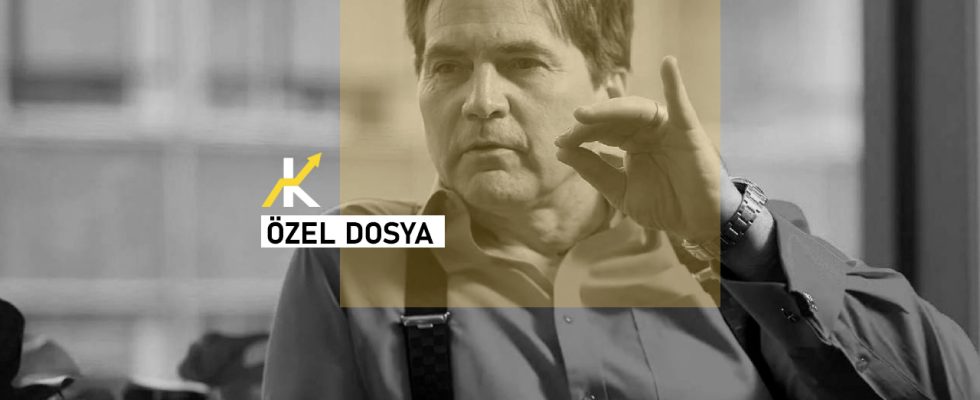Craig Wrigth has been voicing his claim that Nakamoto is the inventor of Bitcoin since 2015. This argument of the 52-year-old computer scientist has not yet been proven. Before the hearing, which will be held in London in January, another question is on the minds, not whether he is Nakamoto or not: Craig Wrigth’s nearly 4,000 approved and pending patents are used by computer programmers around the world; Will Wright allow programmers to open-source these patents as they are now, or will he force them to pay royalties?
Craig Steven Wright was born in 1970 in Australia to a mother who entered data on the punch cards of the first computers and to a father who was a Vietnam veteran. It can even be considered a sage when you look at the more than 20 certificates on the website that belong to those who have a master’s in statistics, a diploma in forensic psychology, and arts certificates.
Says he founded Blacknet before Bitcoin
Wright kicked off his eventful tech career in 1997 “by starting a group of engineers” at Ozemail. Noting that he started working at the Australian Stock Exchange in April 1997, Wright states that he is responsible for the operation of firewalls there. In November of the same year, he founded DeMorgan, which he describes as “an Australian company focused on alternative currency, next-generation banking and security, aiming to create a simple user experience and considering going public.”
Also in 1997, Craig Wright established a trust called R&D, which became the owner of Blacknet, which Wright claims was the forerunner of Bitcoin.
Few people knew Craig Wright’s name from the fall of 2012. At that time, the Australian computer scientist quietly filed the first patent application for the recently invented Bitcoin. Bitcoin was worth $10 at the time. The next year, another little-known exchange named Coinbr raised $5 million “to make Bitcoin easy to use by the ordinary consumer.”
The nascent crypto industry was advancing with a free license agreement for the inclusion of Bitcoin in computer codes, as the free license understanding allowed anyone to use the software. Wrigth, on the other hand, was scrambling to obtain patent protections for new ways to use technology.

In December 2015, when two media outlets named him as a potential Satoshi Nakamoto person, Wright had personally filed two patents and was chief scientist at Switzerland-based company nChain, which has filed for three patents. The life of Wright, who was the CEO of about 15 companies in 2015, has even been the subject of movies. There are those who think that what he wrote in his CV is contradictory, and there are those who argue that his thoughts that “anomaly is a scourge” contradict Bitcoin ideology.
Wright acted as ‘perception management agent’
In the blogs he published on Medium in 2019, he wrote that he went to Venezuela and Colombia as a “perception management agent”, that he was shot twice during the operation, and that he was a priest once.
There are crypto enthusiasts who say that his claims that he is the inventor of Bitcoin are also baseless. Wright will appear in court in London next January to try to prove again his claim that he is Nakamoto.
‘I found Bitcoin’
In a recent interview with Forbes from his London office, Wright reiterates his claim by saying, “I found Bitcoin.” But the focus of this discussion may soon change. Regardless of whether Craig Wright can prove that he invented the currency, if he can use his treasury of 800 approved and 3,000 pending patents at will in the judiciary, he may soon begin to charge for the right to create various blockchain applications. This affects everything from the $1 trillion cryptocurrency market to enterprise apps created by the biggest companies.
Craig Wright also uses precedent-setting legal tactics for software released under free copyright rules, known as open source, in the lawsuit. These include Meta’s widely used open-source JavaScript framework React, Microsoft’s code editing application Visual Studio, and Linus Torvalds’ Linux operating system, which is thought to power 40 percent of the internet. Wright, “I don’t like Silicon Valley. They are the cancer of this world. They’re nothing more than a bunch of communists who think they can steal anything they want.” says.
Sources: Forbes, Cointelegraph
Risk Disclosure: The articles and articles on Kriptokoin.com do not constitute investment advice. Bitcoin and cryptocurrencies are high-risk assets, and you should do your due diligence and do your own research before investing in these currencies. You can lose some or all of your money by investing in Bitcoin and cryptocurrencies. Remember that your transfers and transactions are at your own risk and any losses that may occur are your responsibility. Cryptokoin.com does not recommend buying or selling any cryptocurrencies or digital assets, nor is Kriptokoin.com an investment advisor. For this reason, Kriptokoin.com and the authors of the articles on the site cannot be held responsible for your investment decisions. Readers should do their own research before taking any action regarding the company, assets or services in this article.
Disclaimer: Advertisements on Kriptokoin.com are carried out through third-party advertising channels. In addition, Kriptokoin.com also includes sponsored articles and press releases on its site. For this reason, advertising links directed from Kriptokoin.com are on the site completely independent of Kriptokoin.com’s approval, and visits and pop-ups directed by advertising links are the responsibility of the user. The advertisements on Kriptokoin.com and the pages directed by the links in the sponsored articles do not bind Kriptokoin.com in any way.
Warning: Citing the news content of Kriptokoin.com and quoting by giving a link is subject to the permission of Kriptokoin.com. No content on the site can be copied, reproduced or published on any platform without permission. Legal action will be taken against those who use the code, design, text, graphics and all other content of Kriptokoin.com in violation of intellectual property law and relevant legislation.
